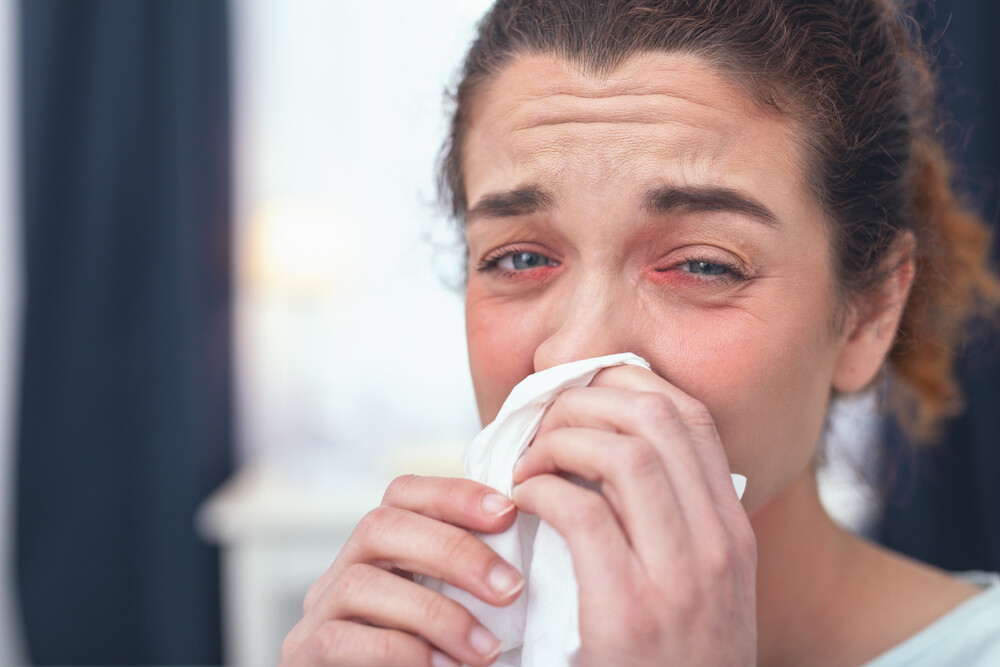Allergic rhinitis usually occurs during the pollen season. You can find out here which symptoms can develop and what helps against it.
What is allergic rhinitis?
The allergic rhinitis usually occurs seasonally during the pollen season. In many cases it can be traced back to the pollen of hay fever. In some cases, however, sufferers suffer from symptoms such as a runny nose or itching all year round. The triggers for this include house dust mites, animal hairs or mould spores (allergens). An allergy is an excessive reaction of the immune system to an actually harmless substance.
Basically, one can fall ill with allergic rhinitis at any time. Often the allergy begins in childhood and lasts for the rest of life, but adults can also fall ill. The WHO estimates that on average one in four Europeans suffer from an allergy-related rhinitis.
Allergic rhinitis; symptoms at a glance
The allergic rhinitis causes inflammatory reactions in the body. Particularly affected are the areas that come into direct contact with the respective allergen. This becomes noticeable through various symptoms:
- Runny nose or stuffy nose
- Sneezing
- Itching
- Reddened, itchy and/or watery eyes
- Burning and itching in the mouth and throat area
- Itching in the ears
- Dry chesty cough
- Breath sounds, shortness of breath
- Redness, itching, wheals on the skin
Some rather unspecific complaints such as persistent tiredness, headaches or sleep disturbances can also indicate an allergic rhinitis. Allergic rhinitis can also develop into asthma.
Causes of allergic rhinitis
Up to now it has not been conclusively clarified why allergies caused by pollen occur at all. Experts suspect a combination of different factors. These include, for example:
- Environmental pollution, e.g. pollution of the environment
- Tobacco smoke
The basic triggers of the complaints in seasonal, i.e. pollen flight-related allergies are above all certain pollen from trees, herbs or grasses. Allergic rhinitis is particularly frequent due to the following allergens:
- Birch
- Alder
- Hazel
- Ash
- Mugwort
- Ambrosia
- Sweet Grasses
If the allergic rhinitis occurs throughout the year, it can have various causes. The following allergies are widespread:
- House dust allergy
- Cat allergy
- Mold allergy
- Various food allergies, e.g. wheat allergy or egg allergy
Diagnosis of allergic rhinitis
Especially if the symptoms only occur seasonally, the suspicion of an allergy is obvious. If the allergen is a so-called late bloomer, which also blooms in the colder seasons, it can be difficult for those affected to distinguish the allergy from a cold. And even with year-round allergies, it is not so easy to find the trigger.
Whether the sniffles are caused by an allergic reaction can be found out by the doctor with a so-called prick test. In this test, for example, the skin on the arm is exposed to various allergens in small doses. If the skin reacts with redness or itching, for example, this indicates an allergy.
Treatment: Which therapy helps against allergic rhinitis?
For acute symptoms such as a cold, a nasal spray and eye drops can be used temporarily. In addition, certain drugs, so-called antihistamines, are used, which are available without prescription from pharmacies.
In order to get rid of the allergy in the long term, only a so-called hyposensitization can help. This involves gradually getting the body accustomed to the allergen in small doses. However, this is a lengthy process: it can take several years before the allergy is actually defeated.

